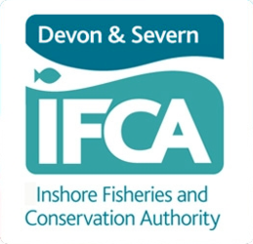Ecosystem Approach
- Home
- Environment & Research
- Marine Environmental Matters
- Ecosystem Approach
Page review/updated 04/12/2024
(Content of page last updated: 1st December 2021)
THE ECOSYSTEM APPROACH
Overall, the ecosystem approach is a strategy for integrated management of land, water, air and living resources that promotes both sustainable use and conservation. At the heart of the ecosystem approach is a thorough consideration of the social, cultural and economic factors that are interdependent with natural capital (summarised here), including the goods and services that people derive from the natural environment. Applications of the ecosystem approach to marine and fisheries management are increasingly being considered. For example, the UK aims to become a global leader in fisheries management and is committed to having a world-class fisheries management system that delivers for fish stocks, fishers and their communities, the natural environment and climate. The ecosystem approach is the preferred option for this but is not yet being adequately applied. Emerging evidence indicates that more adaptive, ecosystem-based, regional approaches to fisheries management are required.
DEFINING AND APPLYING THE ECOSYSTEM APPROACH
The Ecosystem Approach underpins much of UK and EU marine and maritime policy including the Fisheries Act (2020), Common Fisheries Policy (CFP), Marine Strategy Framework Directive (MSFD) and Integrated Maritime Policy (IMP). In 2009, Defra made it clear within its publication ‘Safeguarding our Seas’, that the Ecosystem Approach should be adopted in UK marine policy. The same paper paved the way for the Marine and Coastal Access Act (2009) and hence the formation of IFCAs and the development of the UK’s network of Marine Conservation Zones (MCZs). In 2018 the Government published its 25 Year Environment Plan (25YEP) which confirms the UK’s commitment to the Ecosystem Approach in relation to marine and fisheries management.
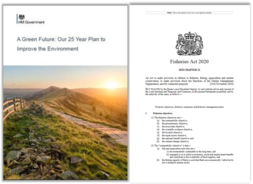
The Fisheries Act (2020) defines an ecosystem approach as one which “ensures that the collective pressure of human activities is kept within levels compatible with the achievement of good environmental status (within the meaning of the Marine Strategy Regulations 2010, and does not compromise the capacity of marine ecosystems to respond to human-induced changes”.
Image: The UK is committed to an ecosystem approach to marine and fisheries management, including through the 25 Year Environment Plan and the Fisheries Act (2020).
The ecosystem approach is at the heart of the “ecosystem objective” of the Fisheries Act, which is that “fish and aquaculture activities are managed using an ecosystem-based approach so as to ensure that their negative impacts on marine ecosystems are minimised and, where possible, reversed, and incidental catches of sensitive species are minimised and, where possible, eliminated”. Ecosystem Based Fisheries Management (EBFM) is therefore becoming a more specific application of the Ecosystem Approach.
Similarly, the current definition of an ecosystem-based approach to fisheries management under the reformed Common Fisheries Policy is “An integrated approach to managing fisheries within ecologically meaningful boundaries which seeks to manage the use of natural resources, taking account of fishing and other human activities, while preserving both the biological wealth and the biological processes necessary to safeguard the composition, structure and functioning of the habitats of the ecosystem affected, by taking into account the knowledge and uncertainties regarding biotic, abiotic and human components of ecosystems”.
This broader consideration of the potential human impacts on fish stocks brings several other policy areas, such as marine planning and UK energy policy, under the umbrella of policy areas which D&S IFCA must be aware of and input into where appropriate.
IFCAS AND THE ECOSYSTEM APPROACH
One of the core principles of the Ecosystem Approach is that management should be decentralised to the lowest appropriate level in order to involve all stakeholders and balance local interests with the wider public interest with the understanding that, the closer management is to the ecosystem, the greater the responsibility, sense of ownership, accountability, public participation, and use of local knowledge. This clearly resonates strongly with the IFCAs’ vision:
‘To lead, champion and manage a sustainable marine environment and inshore fisheries by successfully securing the right balance between social, environmental and economic benefits to ensure healthy seas, sustainable fisheries and a viable industry.’
Defra’s Marine Pioneer programme, which set out to test innovative approaches to governance of the marine environment, concluded that governance needs to be at a scale which connects people – including fishers – with the ecosystem functions, and that co-management using the IFCA framework and scale of management was the best solution to operationalise ecosystem-based co-management.
AN ECOSYSTEM APPROACH TO THE WORK OF D&S IFCA
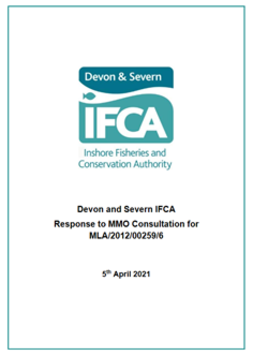
It is recognised that adaptive management is a critical aspect of an ecosystem approach to management. D&S IFCA actively employs adaptive management through its flexible Permitting Byelaw-based approach to fisheries management. The ecosystem approach also allows D&S IFCA to consider the potential impacts of a wide range of human activities on fish and fisheries, and work to minimise these. This underpins D&S IFCA’s engagement in marine planning discussions and consultations, and input into technical working groups for specific marine developments that are likely to affect fish, their habitats and fisheries.
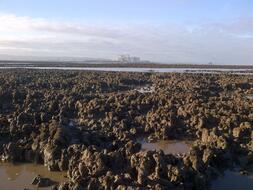
Image: D&S IFCA responds to a variety of consultations for plans, projects and activities in or near to the marine environment to ensure that their potential impacts on fish, fisheries and ecosystems are considered, mitigated and, where possible, avoided. D&S IFCA’s consultation responses are available to view here, under “Marine Environment Matters”.
D&S IFCA has been involved in discussions and has input into formal consultations for developments and activities such as tidal and nuclear power, disposal of spoil at sea, mariculture, flood defences and aggregate dredging.
The potential impacts on estuaries of the abstraction of huge volumes of water to cool nuclear power stations is likely to remain a large focus as the UK shifts to low-carbon forms of energy generation. Estuaries are especially sensitive and important due to their provision of essential fish habitat: estuaries represent important spawning, nursery and feeding grounds for many fish species. Research into essential fish habitat initially focused on the contributions of various nursery habitats to adult populations. However, more recently there has been greater acknowledgement of the functioning of fish nurseries themselves with trophic processes and nutrient cycling being linked to the connectivity of fish populations within estuaries. It is now understood that the physical and biological translocation of nutrients, migrations (ontogenetic, life history, spawning and feeding), food-web dynamics and predator-prey interactions of fish in nursery areas play a crucial role in structuring biological populations, communities and assemblages and in driving the biological processes that support them. This marks a significant theoretical shift away from only considering the value of nursery areas in terms of the contribution they make to adult populations, and demonstrates the importance of protecting essential fish habitats from marine and coastal developments.
Image: The Severn Estuary contains a range of intertidal and subtidal features that are considered essential fish habitat, such as this Sabellaria reef (foreground). However, the estuary and its associated habitats may be vulnerable to impacts from human activities including marine developments. Hinkley Point power station can be seen in the background.
Consultation responses, like other aspects of D&S IFCA’s work, require data about local fish stocks and ecology, which is often lacking. To address this lack of evidence, and provide a step towards a local application of the ecosystem approach to fisheries management, D&S IFCA is developing Fisheries Research and Management Plans (FRMPs) for fish species relevant to the D&S IFCA’s District. FRMPs collate, review and critically analyse existing data on fish stock structure and ecology, fisheries management and marine environmental management to identify gaps in knowledge which may hinder current or future efforts to manage those stocks. Critically, FRMPs include both scientific and local anecdotal information and consider a broader range of activities than would typically be included in a fisheries management plan. For each species the FRMPs identify key gaps in knowledge in terms of ecology, fisheries and impacts of other activities. Each FRMP will result in a prioritised research portfolio that can be used by researchers to identify and pursue policy- and management-relevant research projects. Furthermore, any implications for management of the stocks considered are summarised and the lead authority identified.
D&S IFCA is also involved in a range of regional and national research and policy groups that are linked to an ecosystem approach to management, with aims ranging from improving the overall condition and management of the environment to pursuing an ecosystem approach to enable world-class fisheries. These groups include the Association of Severn Estuary Relevant Authorities, Defra’s Ecosystem Approach and Blue Carbon Groups, and the North Devon Marine Pioneer Programme.
D&S IFCA AND THE MARINE PIONEER
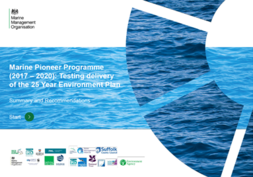
The Marine Pioneer programme has recommended that the UK implements an ecosystem approach to fisheries management, and has highlighted that this will require use of integrated (social- ecological) assessments such as natural capital asset and risk registers in conjunction with integrated policies, management and regulation that are inclusive and participatory as well as ecologically robust. The Marine Pioneer has also recommended that fisheries management should be integrated with marine management more broadly, allowing the full range of impacts on fish stocks from human activities to be considered in assessments.
Image:
A summary of the learnings and recommendations from the Marine Pioneer Programme is available to download here.
